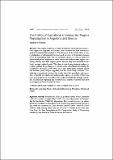|
Reseña:
|
This article studies the continued existence of subnational undemocratic regimes in Argentina and Mexico, two countries that have recently experienced national democratization. The first part of the article offers a conceptualization of subnational democracy and measures its territorial extension across all subnational units. The second part explores a common, albeit not systematically tested explanation about subnational undemocratic regime continuity, namely, that these regimes persist because they meet national incumbents’ strategic political needs. This claim is tested using statistical analyses to contrast patterns of spending across undemocratic subnational untis during the presidencies of Menem (1989-1999), De la Rúa (2000-2001), Duhalde (2002), and Kirchner (2003-2007) in Argentina, and Fox (2000-2006) in Mexico. Contradicting conventional wisdom, the results show that presidents only reproduce a handful of subnational undemocratic regimes, as not all of them can meet presidential needs. In addition, the results reveal that the strategic calculation of presidents regarding this reproduction is dictated by factors that have been largely overlooked by the literature. |

